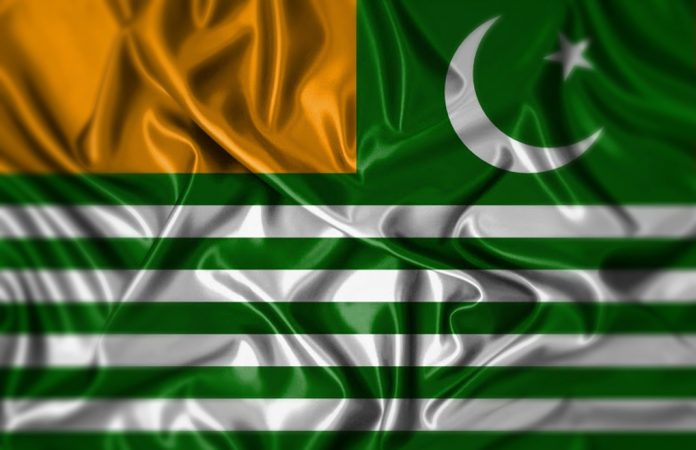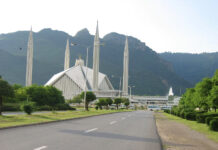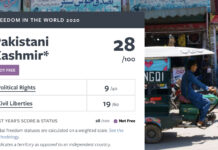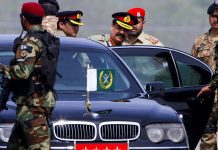Mainland Pakistanis
By the term, mainland Pakistanis, I am strictly referring to Pakistanis from areas that constitutionally make up the territory of Pakistan. I am not speaking of nationality laws that apply to the citizens of Pakistan, but rather a defined area that is internationally recognised as the ‘Islamic Republic of Pakistan’. Collectively, the four Provinces of Pakistan, its Tribal Areas and Federal Capital, have a defined relationship with the Federal Government of Pakistan.
Pakistan comprises of:
-
Provinces; Punjab, Sindh, Khyber Pakhtunkwa, Occupied Baluchistan
-
Tribal Areas (Pashtun areas that belong to Afghanistan)
-
Federal Capital of Islamabad (this area used to be part of the Pahari-Pothwari homeland)
‘Azad’ Jammu & Kashmir and the Northern Areas are two separate political and geographical entities that once formed part of Kashmir State, but had never formed part of the landmass directly partitioned by the British to form our modern-day territories of Pakistan (West Pakistan) and, more latterly, Bangladesh (East Pakistan).
Erstwhile Jammu & Kashmir comprised of:
-
Jammu (Duggar, Pahari Ilaqah, Kashur)
-
Kashmir (Kashur, Pahari Ilaqah)
-
Frontier Province (Ladakh, Gilgit Baltistan)
What’s the difference between so-called Azad or Free Kashmir (Pakistan Occupied Kashmir) and Pakistan?
‘Azad’ Kashmir and the Northern Areas (Pakistan Occupied Kashmir) are, as a matter of fact, disputed internationally. Both areas are in a sense acknowledged to be physically occupied by Pakistan’s military, with or without the consent of the locals, and contrary to the legal norms that created the decolonised nation-states of British India. It was an Act of the British Parliament, the Indian Independence Act, 1947, that not only gave independence to its colony of British India but which crucially created Pakistan. We are operating within the framework of a political-cum-legal process. Here lies the subtle distinction between peoples i.e., subjects and citizens, and lands, i.e., territories and political systems. The legal processes that created Pakistan also necessarily laid down the legal frameworks by which its people were to be categorised and governed, explicitly, implicitly, or excluded from the reach of the State’s executive branch through military ordinances. The two overlap and complement one another and laypersons can be forgiven for thinking they are one and the same thing.
They are not.
It is to this backdrop we look when appraising the status of ‘Azad’ Jammu & Kashmir and the Northern Areas. The first point to note is that they are not part of Pakistan, de jure (by right) but de facto (‘denoting something as a fact, as opposed to it accruing on account of a right’) as a consequence of military force and not out of any legal entitlement that is internationally recognised.
The second point to note is the inferior relationship of the peoples of the two territorial entities with the actual institutions and branches of the Pakistan State. The obvious question that arises from this political arrangement is intuitive; are the peoples of these two regions Pakistanis?
Yes and no, and in very circumspect degrees.
The answer is anything but simple for a host of factors that muddy a straightforward equation that connects a designated nation with a designated territory, and even this is to look at the issue purely from an outsider’s perspective, dispassionately.
Trying to speak objectively about political and territorial realities can be undermined by a people’s own sense of national belonging and/or aspirations; the emotional investiture can be all encompassing especially for those who have no understanding of how nation states emerged in the full light of history. However, emotions and well-intentioned ignorance are not counterweights to facts.
Technically, the most we can say about the hereditary residents of ‘Azad’ Kashmir and the Northern Areas, to use the proper legal terms, is that they are the state-subjects (nationals) of the erstwhile Princely State of Jammu & Kashmir (nation), in other words they are Kashmiris (Kashmir Mulki – nationals of Kashmir country). Their relationship with the state agencies and laws of Pakistan are mediated through their primary status as being the nationals of either ‘Azad’ Kashmir or the Northern Areas. They can avail themselves of a kind of Pakistani citizenship that would allow, for instance, the acquisition of Pakistani passports, all the while denuded of substantial rights ordinarily attainable by mainland Pakistanis, which they’re not. Poor and dispossessed Pakistanis are similarly disenfranchised in Pakistan, to not pity Azad Kashmiris against the mass of ordinary Pakistanis.
In older forms of Pakistani passports issued to the nationals of ‘Azad’ Kashmir, it clearly states that the bearers of the passports are the citizens of the former Princely State of Jammu & Kashmir. In newer Passports and especially ID cards, The Pakistan Occupier has deliberately reduced the size of the font declaring ‘Azad Riyasat (state) of Jammu & Kashmir’, deliberately making the red ink feint, almost imperceptible to read. Whatever the antics of the Pakistan Occupier, the citizens of Kashmir State are Kashmiris in the same way citizens of the UK are British, citizens of Canada are Canadians; Citizens of the USA are Americans.
It is merely a consequence of their secondary status as Pakistani citizens on account of their primary status as state-subjects of parts of Kashmir State occupied by Pakistan that there is a huge imbalance between what rights the people demand and what rights they actually get from Pakistan’s ruling establishment, civilian and military. Pakistan’s Military Complex and Security Apparatus, which includes the Police and imposter-type Azad Kashmiris imported from Pakistan to push the demography of divided Jammu & Kashmir in favour of accession to Pakistan are strongly despised in Azad Kashmir.
For reasons cited above, most observers use the terms Pakistan-occupied-Kashmir or Pakistan-administered-Kashmir to highlight the separate nature of the two territories and respective peoples from Pakistan. Both terms can be emotive depending on how you define Pakistan’s control over its Kashmir holdings. India prefers the term, Pakistan-occupied-Kashmir; the international community seeking to be a honest broker between India and Pakistan prefers the term, Pakistan-administered-Kashmir; whilst Pakistan prefers the term ‘Azad’ (free/independent) State of Jammu and Kashmir. By this logic, domestically acknowledged by Pakistan’s highest court and international legal and political bodies to which Pakistan is a voluntary member, Pakistan does not have an automatic claim or right to either of the two territories.
Because of this deliberate legal quandary, Pakistan-administered-Kashmir is subjected to laws and, worse, military regulations that are discriminatory in nature and which have created a popular backlash in both ‘Azad’ Kashmir and the Northern Areas.
As a direct consequence, the educated and politically astute inhabitants feel little more than second class citizens in their own homeland. For the purpose of my analysis, this has serious implications for how mainland Pakistanis diminish the justifiable grievances of the ‘state-subjects’ of Kashmir State, labelling them ‘cantankerous’ and ‘ungrateful’ not least because of a state-enforced narrative that renders Pakistan the saviour of Hindustan’s Muslims.
Ethnonationalist Pakistanis who subscribe to such intellectually bankrupt positions have no sense of the vile crimes committed by the Pakistan State against ethnic minorities who resist political occupation in their own homelands. Whenever I use the term mainland Pakistanis, I am therefore not speaking of Azad Kashmiris or British Azad Kashmiris (or even ordinary Pakistanis brutalised by the same state infrastructure). The former are, for all intents and purposes, stateless, whilst British Azad Kashmiris have the same rights ordinary Britons have on account of a functioning democratic and legal system that defers to the Rule of Law and the writ of the UK Parliament. Pakistanis have no such rights in Pakistan either.
Where there is a difference between dispossessed Pakistanis and stateless Azad Kashmiris, the latter are Occupied by Pakistan, whilst Pakistanis are not occupied by Azad Kashmir. That’s the key difference.
That said, Azad Kashmiris are essentially Pakistan Occupied Kashmiris, which might account for the anger emanating out of Azad Kashmir towards British Azad Kashmiris flying Pakistani Flags in the UK, ignorant of Pakistan’s eggregious exploitation of Azad Kashmir and Gilgit Baltistan. Every Occupied country on earth has native clients (Judas) doing the bidding of Occupiers and Azad Kashmir is no different.
Pakistan’s pseudo Pakistanis; The ‘Azad’ Kashmir anomaly
It is on account of this internationally acknowledged reality I had in mind when I stated that most British Azad Kashmiris are simply ignorant of ‘A’JK’s status as an Occupied Territory of Pakistan that isn’t really part of Pakistan.
Let us briefly appraise this fact with the founding documents of either state.
Part 1, Article 1, (2) of the Constitution of the Islamic Republic of Pakistan reads,
The territories of Pakistan shall comprise –
(a) the Provinces of Balochistan, the Khyber Pakthunkhwa, the Punjab and Sindh;
(b) the Islamabad Capital Territory, hereinafter referred to as the Federal Capital;
(c) Federally Administered Tribal Areas; and
(d) such States and territories as are or may be included in Pakistan, whether by accession or otherwise.
Part 12, Article 257 reads,
When the people of the State of Jammu and Kashmir decide to accede to Pakistan, the relationship between Pakistan and the State shall be determined in accordance with the wishes of the people of that State.
Article 258 reads,
Subject to the constitution, until Majlis-e-Shoora (Parliament]) by law otherwise provides, the President may, by Order, make provision for peace and good government of any part of Pakistan not forming part of a Province.
Aside from failing to mention ‘Azad’ Kashmir by name in part 1, article 1, Pakistan’s constitution clearly stipulates the internationally recognised fact that ‘Azad’ Jammu & Kashmir is not part of Pakistan de jure but de facto. In other words, because Pakistan physically occupies the territory, it is part of Pakistan, but not because it has any legal right to the territory.
This is a position that Pakistan is very proud of as it accuses India of forcibly annexing its part of Kashmir without consulting its occupied people; it is through the consent of the native state subjects of Kashmir State that Pakistan will have a rightful, note, ‘de jure’ claim to Kashmir eventually. Pakistan’s official position on Azad Jammu & Kashmir is therefore in principle democratically salient – “the people of the territory must decide their territory’s exact status through a fair and free plebiscite.”
What could be more democratic?
This sentiment has been echoed in numerous official statements from the highest echelons of Pakistan’s power structure from the earliest days, when the country came into existence up until today. In 1947 Muhammad Ali Jinnah (1876 CE – 1948 CE), the founder of Pakistan, an otherwise clandestine Atheist, stated,
“That after the lapse of paramountcy the Indian States would be constitutionally and legally sovereign states and free to adopt for themselves any course they wished. It is open to States to join Hindustan Constituent Assembly or Pakistan Constituent Assembly or to decide to remain independent.”
Kashmir State was not part of British India that formally comprised of Provinces (or Presidencies as they were known earlier). At the time of independence, there were 17 Provinces. Kashmir State was not a Province. It was a Princely State independent of British India but still subject to British Paramountcy; the colonial Brits were still in charge. There were approximately 562, 565 or 584 Princely States, depending on which figures you rely on. The partition of India and the commission responsible for partitioning it into the Dominion of Pakistan and the Dominion of India had no authority to partition the Princely States in accordance with their respective populations.
When the British vacated India, it was the responsibility of the Princely States, and by this I mean their rulers, to either accede to India or Pakistan. The overwhelming majority did just that pocketing generous pensions from the successor State, only to have them withdrawn some decades later. There were, however, a few that wanted to remain independent, a position that was not countenanced by the British Indian government, who wanted the majority Muslim areas to become part of Pakistan, whilst the rest were encouraged to accede to India.
Jinnah, unlike his Congress counterparts, was prepared to publicly support a Princely State’s ambition to remain independent, but what this meant practically is an altogether different proposition. Howsoever we look at this claim, the sentiment should nonetheless resonate with my readers – Kashmir State is not an integral part of Pakistan, a position routinely countenanced by Pakistan’s politicians in their private dealings with the UN and the international community, whatever their populist rhetoric that “Kashmir is Pakistan’s jugular vein”.
Consider the following official statement from Pakistan’s Ministry of Foreign Affairs, adorning the country’s official website, 2005 – 2009,
“Pakistan’s principled position on Jammu and Kashmir is based on the UN Security Council Resolutions, which provide that the final disposition of Jammu and Kashmir will be made in accordance with the will of the people. Pakistan is committed to this position until the three parties to the dispute, Pakistan, India and the people of Jammu and Kashmir arrive at some mutually acceptable final settlement.”
In 2006, a similar statement was made by a foreign office spokesperson,
“Pakistan’s legal position on Jammu and Kashmir dispute is based on the UN resolutions. Kashmir is a disputed territory. According to the UN Security Council’s resolutions, Pakistan and India are parties to this dispute and Kashmiris have to essentially decide their future. It is about the aspirations of Kashmiri people. Pakistan does not claim Kashmir as its integral part. Kashmir is disputed. We however hope that when Kashmiris are able to exercise their right to make a choice, they would opt for Pakistan. The president did not talk about giving up Pakistan’s position on Kashmir. Azad Kashmir has its separate identity with its own President and Prime Minister. It is not a province of Pakistan. If it were so, there would have been a Governor and Chief Minister instead of President and Prime Minister.”
These dishonest sentiments are even written into the constitution of ‘Azad Jammu & Kashmir, technically an Act of the Pakistan Parliament, otherwise known as the ‘AJK Interim Constitution Act 1974’. Anyone with the most basic familiarity with constitutional matters will instinctively know the difference between a ‘Constitution’ and an Act of Parliament or, a written law passed by a legislative body.
Constitutions are fundamental documents over and above any ‘Act’ of a ‘Parliament’ or law-making body. Ordinarily, they are the product of Constituent Assemblies, which in the arena of functioning (liberal) democracies are made up of the representatives of the people to be governed under the constitution.
A constitution thus defines authoritatively the working relationship between the various organs of a State; it enumerates fundamental principles or established precedents according to which a State is acknowledged to be governed. The constitution, if it germinates within a liberal tradition, will also guarantee a place for the ordinary person on the street (who may have no one to protect his/her interests) in a society ruled by elites through something akin to a Bill of Rights.
A Bill of Rights is a formal declaration of the legal and civil rights of the citizens of a State’. In other words, States exist for the welfare of their citizens and not the other way round; constitutions entrench that principle, so no one, no matter how powerful or rich, can fundamentally alter that priority.
And so a statute in the strictest sense of the term is thus on a much lower scale, it is the product of a legislative body that itself owes its existence to the auspices of the Constitution – the product of a Constituent Assembly – the manifest expression of the people’s will. And so the constitution of ‘Azad’ Kashmir is not the product of its liberated people, as Pakistan would want the international community to believe, but an Act of its own Parliament tipping the balance in favour of its own institutions, civil actors and bureaucrats.
In any case, what does the interim constitution of Azad Jammu & Kashmir State say about its own territorial status?
Its preamble reads,
WHEREAS the future status of the State of Jammu and Kashmir is yet to be determined in accordance with the freely expressed will of the people of the State through the democratic method of free and fair plebiscite under the auspices of the United Nations as envisaged in the UNCIP Resolutions adopted from time to time;
AND WHEREAS a part of the territories of the State of Jammu and Kashmir already liberated by the people are known for the time being as Azad Jammu and Kashmir;
AND WHEREAS it is necessary to provide for the better Government and administration of Azad Jammu and Kashmir until such time as the status of Jammu and Kashmir is determined as aforesaid and for that purpose to repeal and re-enact the Azad Jammu and Kashmir Government Act, 1970, with certain modifications;
On reading these clauses, and the previous articles of the Pakistan constitution, one cannot be in any doubt we are dealing with a territorial polity separate from Pakistan but yet controlled by Pakistan to the point where the ‘sovereign residents’ – hereditary state subjects – are not Pakistanis in any meaningful sense of the term and yet Pakistan’s writ runs absolutely supreme.
In fact, part 8, article 258 of Pakistan’s constitution implicitly stipulates autocratic rule for ‘A’JK; “Subject to the constitution,… the President may, by Order, make provision for peace and good government of any part of Pakistan not forming part of a Province.” There is no allowance here for the people’s wishes or objections, nothing by way of democratic uprising or sentiment would alter this priority if they disagreed with the Orders.
It is here we should understand the point of citing the aforementioned passages. The unfortunate status of ‘A’JK as a separate polity from Pakistan all the while controlled by Pakistan opens the door for massive economic and political exploitation which makes a sham of ‘A’JK’s supposedly autonomous credentials.
‘A’JK is treated differently because it isn’t a ‘Province of Pakistan’ and so the necessary arrangements aren’t in place between the Islamic Republic of Pakistan and the Independent government (‘Azad Hukumat’) of the ‘Liberated State’ (‘Azad Riyasat’) of Jammu & Kashmir. In common parlance, those with some insight would refer to such an arrangement, albeit politely, as being in a state of limbo. Many other words can be used to describe this situation – ‘shafted’ comes to my mind. The ‘A’JK polity is not worthy of the title free! It is exactly what the international community perceives it as, a client-state of Pakistan lacking democratic teeth. Azad Kashmir is thus Occupied by Pakistan.
And yet no one from the polity can practically challenge Pakistan or take it to task for the imbalanced relationship between the two unequal entities; no matter how loyal one feels to Pakistan (a tiny minority of native clients accused of being traitors to their own mothers and fathers), or whether one demands independence (the overwhelming mood now), both ‘attitudes’ will be considered outside the pale.
Section 7, under the clause ‘Freedom of Association’, AJK Interim Constitution Act, 1974, Article 1 stipulates,
1) “Subject to this Act, every State Subject shall have the right to form association or unions, subject to any reasonable restrictions imposed by law in the interest of morality or public order”.
Now, what exactly are those reasonable restrictions imposed by law and in the interest of morality or public order? The following clause stipulates,
2) “No person or political party in Azad Jammu and Kashmir shall be permitted to propagate against, or take part in activities prejudicial or detrimental to, the ideology of the State’s accession to Pakistan.”
Ah, so it’s immoral according to undemocratic despots, as far as the architects of these laws are concerned, for the, supposedly, sovereign people of ‘A’JK to have a separate future from that of Pakistan, if thats what the majority want?
And, to remind us again, what exactly is a ‘State Subject’? The following definition is given in the same ‘Interim Act’,
“State Subject’ means a person for the time being residing in Azad Jammu and Kashmir or Pakistan who is a State Subject, as defined in the late Government of the State of Jammu and Kashmir Notification No I-L/84,dated the 20th April,1927 as amended from time to time.”
To put this concept into its proper context, let us remind ourselves once more what exactly is ‘Azad Jammu and Kashmir’? The Interim Act stipulates,
“‘Azad Jammu and Kashmir’ means the territories of the State of Jammu and Kashmir which have been liberated by the people of that State and are for the time being under the administration of Government and such other territories as may hereafter come under its administration.”
These clauses, read in conjunction with other clauses, whether in Pakistan’s constitution or in the Interim Act that is being passed as the ‘A’JK constitution expose the farce of ‘A’JK’s autonomous democratic credentials. What kind of ‘liberation’ is this that asserts the moral high-ground by some of the most corrupt people to have lived on this earth, giving a ‘people’ the right to decide their own future, publically and with fan-fare, audaciously hardcoding such enlightened principles into a sham constitutional framework, and yet, all the while, making it practically impossible for the same people to actually experience it?
The term ‘activities prejudicial to Pakistan’ in clause 2 of the AJK interim Act can be interpreted in such a way to safeguard the imbalanced status quo, even to the detriment of ‘Azad’ Kashmir, and yet the offending clause finds expression in the Constitution of a polity supposedly separate from Pakistan. So what about all that talk about giving the people the right to determine their own future; free and fair votes for all?
It’s a farce.
Everyone seems to know it’s a farce, except for that latent mass of uneducated British Azad Kashmiris, who like to wave Pakistani flags in British cities much to the annoyance of ‘Azad’ Kashmiris aware of their people’s plight and suffering. Today, native Azad Kashmiris are now suspicious of Pro-Pakistan Kashmiris – ethnic Pakistani-Punjabis – who do not originate from the State. It would appear most are Pakistani Punjabis who have no genuine connection to Jammu & Kashmir, and one can see this in how they constantly berate Azad Kashmiris fighting for independence. No genuine nation would ever assail members fighting for the dignity of their own people against Occupation, except those who don’t feel part of such people in the first place. Thus, I have my reasons to suggest that I doubt such people are actually from Azad Kashmir, or any part of Jammu & Kashmir.
And so, when anyone from the State speaks up against the injustices prevailing in the State as a direct result of its maladministration by Pakistan, they are condemned as being disloyal to Pakistan, arrested and prosecuted. Those fortunate to have been employed by the polity and working in the interest of their own people are summarily sacked.
Clause 9 of the ‘A’JK Interim Act, ironically under the heading ‘Freedom of Speech’ stipulates,
“Every State subject shall have the right to freedom of speech and expression, subject to any reasonable restrictions imposed by law in the interest of the security of Azad Jammu and Kashmir, friendly relations with Pakistan, public order, decency or morality, or in relation to contempt of Court, defamation or incitement to an offence.”
In fact, Pro-Independence Kashmiris can not even stand for elections, mobilise one’s people against injustice, economic exploitation or political corruption, should such a candidature be deemed prejudicial to Pakistan, or at the cost of ‘friendly relations‘ with Pakistan. Friendly relation with Pakistan means enmity against Kashmir’s Independence. And for good measure, all elected parliamentarians of the ‘A’JK Assembly must swear an oath of allegiance to Pakistan (Yazid is the name now given to such Pakistanis), the very cost of the polity’s liberation. In Muslim history, Yazid murdered the Prophet’s grandsons and family in the name of usurping power, this is exactly how such duplicitous Muslims are now percieved.
For instance, the Oath for the President of the ‘A’JK Assembly reads,
“I [name] do solemnly swear that I am a Muslim and believe in the Unity and oneness of Almighty Allah, His angels, the Books of Allah, the Holy Quran being the last of them, his prophets, the absolute finality of the prophethood of Muhammad (Peace be upon him), the day of Judgment , and all the requirements and teachings of the Holy Quran and Sunnah; That I will remain loyal to the country and the cause of accession of the State of Jammu and Kashmir to Pakistan (note, Jinnah was most likely a clandestine Atheist); That I will perform my functions as Prime Minister honestly and faithfully; and That I will not directly or indirectly communicate or reveal to any person any official secret which may come to my knowledge as Prime Minister of Azad Jammu and Kashmir; So Help me Allah.”
Aside from disenfranchising the non-Muslims of the State (apparently there aren’t any, everyone of us is Muslim like the duplicitous self-serving Muslims of Pakistan who have zero connections with Islam), it is therefore an openly acknowledged fact by constitutional experts, jurists, political scientists, human rights experts, academics, charity workers, an intellectually honest human beings that the democracy on show in ‘A’JK is a massive sham where low-level officers from the Pakistan mainland have more executive powers than the elected representatives of the ‘A’JK Parliament. Why would disinterested and dispassionate outsiders make such claims if they weren’t true especially when they have nothing to gain from rudely waking up British Azad Kashmiris, whilst smashing Pakistani sensibilities?
Pakistanis are Out of Touch on Azad Kashmir, 1971
No Title
President Yahya Khan interview on the Eastern region and refugees. Date: 31/07/1971
Where the Aid Money is going in Pakistan? 2015
Fatima Bhutto
At the age of 14, Fatima Bhutto huddled in the corner of a closet shielding her baby brother while shots rang out in the streets outside her home. Those shots killed her father and continued the legacy of blood that marks her family and her country.














